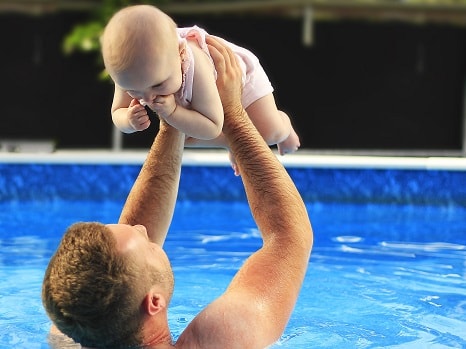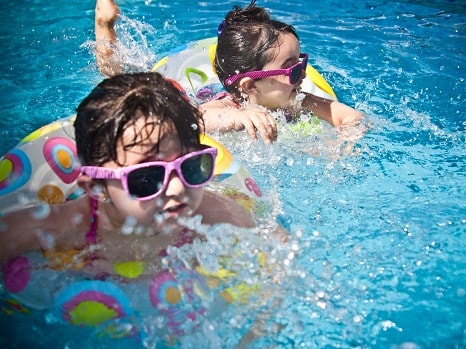How to Avoid and Deal with Your Child’s Pee and Poop Accidents in a Swimming Pool

People ranging from Olympic athletes to toddlers can mistake a pool for a potty, but we can all agree that a pool is for playing and not for using as a giant toilet bowl. When you want to keep the pool kid-friendly, it’s important you know the dangers involved, how to avoid potty accidents, and if all else fails how to clean up the mess.
Is Peeing in the Pool Unsafe?
While urine isn’t a welcome addition to any pool, a correctly maintained swimming area will be safe even if there’s a pee accident.
Swimming pool chemicals kill harmful bacteria transmitted from pee. Urine can actually be ingested in small portions and cause no harm, even without the help of pool chemicals. Still, urine doesn’t improve health and is better left out of a pool.
All in all, a little pee in a chlorinated pool water poses little to no risk. A correct chemical balance in the water will make sure you and your children are safe to swim if someone doesn’t make it to the bathroom.
Is Pooping in the Pool Unsafe?
Because of health hazards, going number 2 in the pool is much more dangerous than number 1. Rick Leviton, an expert in swimming pool safety at Pool Guard Texas, explains this in more detail:
Accidentally ingesting fecal matter may cause illnesses that are especially serious for children. It’s recommended that people shower to clean off what toilet paper can’t before jumping in a pool.
“A high number of disease-causing germs and bacteria in swimming areas come from stool. Poop can carry Shigella, norovirus, and E. coli to name a harmful few, which goes to show how dangerous feces can be in the water. Unlike with urine, pool chemicals like chlorine and bromine could take days to kill germs transmitted from a potty accident while swimming. Preventing poop in the pool means your family can keep enjoying the water.”
How to Tell if Your Child Has Peed in the Water?
You’ve probably heard of pool chemicals that change the water color when coming in contact with urine. These rumors are false, so anyone who relieves themselves in the pool has a good chance of being safe from embarrassment.
However, this makes it a little more difficult for you as a parent to catch when your child has relieved themselves while swimming.
Generally, the most reliable way to tell if there has been a potty accident is to pay attention to water temperature while being close to your kid. Urine leaves the body near 90 °F to 100 °F, which is hotter than a typical pool’s water. If the water suddenly feels warmer to you, then urine coming from a person who is next to you is the likely cause.
If you aren’t in the pool, you can also pay attention to any potty dances your child is prone to do or other visual tells they have before they use the bathroom.
Ways to Prevent Your Kid from “Accidents”

Talk to Your Child
You can tell your child that using the pool as a bathroom isn’t clean and could make them sick.
Explain that they wouldn’t like swimming in another child’s pee, so they shouldn’t use the pool as a bathroom either.
You can use the tried-and-true “babies do that, and you aren’t a baby anymore” approach to coaching the correct behavior.
Take Advantage of the Urine-Indicating Paint Myth
As mentioned before, pool urine detector chemicals that change color when someone peed in the water don’t exist. However, your child may not need to know that.
You can use this myth to your advantage by telling your child that if they use the bathroom in the pool, the water will turn a noticeable color and alert the other children and swimmers that your kiddo had an accident.
While this isn’t the most truthful approach, it could do the trick if your child needs an extra push.
Swim Diapers
Regular diapers won’t work in the pool. Swim diapers are built for playing in the water, and there are different designs to consider to find the best fit.
Swim diapers hold in poop and prevent fecal contamination. It’s important to note that liquid poop won’t be easily held in.
While many parents think swim diapers also protect against number 1, this is false. Swim diapers will not hold pee like a regular diaper, so it’s important to not substitute a swim diaper for a regular diaper or vice versa.
There are disposable and reusable swim diapers available. Disposables are cheaper and generally more convenient, but might not be as secure. Reusable diapers commonly come with Velcro or snaps to give a more snug fit at the cost of being more expensive and requiring more maintenance for repeated use.
Many parents find that using two layers of protection in the pool decrease the chance of leakage and make for easier cleanup.
Use Potty Breaks
Have your child use the bathroom before jumping in the pool. Also, call for other potty breaks every thirty minutes or so to differentiate the toilet and the pool.
Time Outs
If you notice the water changing temperature or guess your child used the bathroom through other means, pull your child from the pool and make it clear to them that their behavior is unacceptable.
A short time out and explaining why the child can’t play in the water could be highly effective.
What to Do in Case of a Poop Accident
First and foremost, if your child had an accident in a public pool, report the pool incident to the staff as soon as you can. Because feces pose serious health risks, the safety of others is more important than saving yourself from any embarrassment by staying quiet.
If you’re at a private pool, alert the other swimmers and have everyone exit the water. The pool will need more cleaning measures than chlorine to make the water safe again.
To limit the amount of poop that’s escaping your child’s diaper, wrap a towel around your child’s lower body after removing them from the pool. This acts as another layer to keep any solids from contaminating a larger area or dirtying yourself.
It’s important to plan ahead and get a clear course of action before diving in. Take stock of your available resources before your hands are full with a naked, soiled, and possibly upset child.
In a bathroom, you can remove the diaper, any clothing, and the towel to begin the clean-up process and remove any fecal matter safely with skin-safe wet wipes, hot water, and soap.
Remember not to leave your child unattended while you dispose of soiled things or gather cleaning supplies. Also, don’t forget to thoroughly wash your hands and clean yourself off before exiting the bathroom.
You could also take this as an opportunity to speak with your child about how important it is that they don’t have another accident in the pool. If they are old enough to understand, explain the dangers of using the bathroom in the water and offer suggestions for what your child should do if they feel they need to urgently use the bathroom while swimming.
Lastly, preparing for this type of emergency will make all the difference. Before going to the pool, consider putting together an emergency kit in case of a poop accident that contains a change of clothes, disposable wipes, trash bags, hand soap and sanitizer, disinfectant wipes to clean surfaces, and other products you think may be especially useful to you and your child.





